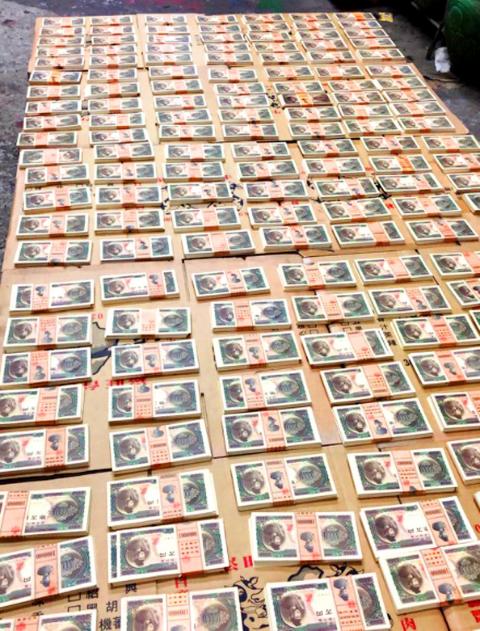A New Taipei City woman has been detained for allegedly colluding with a counterfeiting ring in China that forged Japanese yen, US dollars and Deutsche marks that could fool experts, the Coast Guard Administration (CGA) announced yesterday.
“This is the largest currency counterfeiting case we have cracked in recent years,” Investigation Branch head Ruan Wen-chieh (阮文杰) said.
The 67-year-old women, surnamed Chen (陳), was apprehended yesterday and is being charged with breaches of the Smuggling Penalty Act (懲治走私條例) and securities forging offenses.

Photo: CNA
A raid of Chen’s residence in New Taipei City’s Yingge District (鶯歌) last week uncovered billions in forged bills — ¥228 million (US$2.05 million), US$3 million and 4 billion Deutsche marks (US$2.3 billion).
The bust was the result of cooperation between Taiwan and Japan, Ruan said, adding that in 2017, Japanese authorities told their Taiwanese counterparts about a Taiwanese woman who had been smuggling counterfeit Japanese yen to Okinawa.
“Our agency formed a task force and has been monitoring the case for more than one-and-a-half years,” Ruan added.
“It is very rare to see such sophisticated forgery of Japanese yen bills, because of the difficulties involved. The Japanese mint uses very special materials to create the paper for their currency and they add unique coloring agents that give a slight yellowish tone to the bills,” he added.
Whenever counterfeit bills were discovered in Japan, they would send their experts to Taiwan to examine the forgeries, he said.
Chen in 2012 set up a company for the smuggling operation and took trips to China to meet with a forgery ring, and would smuggle counterfeit Japanese yen on her return flight to Taiwan, investigators said.
Chen reportedly had a sales catalogue made up for her customers and also sold the forged bills to intermediaries, who profited by selling the fake bills or spending them at stores, they said.
Investigators estimate that Chen smuggled about ¥500 million in counterfeit yen from China to Taiwan over the years, saying that she allegedly sold about half of the bills for 15 to 20 percent of their face value.
“We believe that some customers transferred the counterfeit bills to other countries in Asia, while the fake US bills and Deutsche marks were sold in Japan, as they can serve as collateral for private loans there,” Ruan said.

INVESTIGATION: The case is the latest instance of a DPP figure being implicated in an espionage network accused of allegedly leaking information to Chinese intelligence Democratic Progressive Party (DPP) member Ho Jen-chieh (何仁傑) was detained and held incommunicado yesterday on suspicion of spying for China during his tenure as assistant to then-minister of foreign affairs Joseph Wu (吳釗燮). The Taipei District Prosecutors’ Office said Ho was implicated during its investigation into alleged spying activities by former Presidential Office consultant Wu Shang-yu (吳尚雨). Prosecutors said there is reason to believe Ho breached the National Security Act (國家安全法) by leaking classified Ministry of Foreign Affairs information to Chinese intelligence. Following interrogation, prosecutors petitioned the Taipei District Court to detain Ho, citing concerns over potential collusion or tampering of evidence. The

Seventy percent of middle and elementary schools now conduct English classes entirely in English, the Ministry of Education said, as it encourages schools nationwide to adopt this practice Minister of Education (MOE) Cheng Ying-yao (鄭英耀) is scheduled to present a report on the government’s bilingual education policy to the Legislative Yuan’s Education and Culture Committee today. The report would outline strategies aimed at expanding access to education, reducing regional disparities and improving talent cultivation. Implementation of bilingual education policies has varied across local governments, occasionally drawing public criticism. For example, some schools have required teachers of non-English subjects to pass English proficiency

‘FORM OF PROTEST’: The German Institute Taipei said it was ‘shocked’ to see Nazi symbolism used in connection with political aims as it condemned the incident Sung Chien-liang (宋建樑), who led efforts to recall Democratic Progressive Party (DPP) Legislator Lee Kun-cheng (李坤城), was released on bail of NT$80,000 yesterday amid an outcry over a Nazi armband he wore to questioning the night before. Sung arrived at the New Taipei City District Prosecutors’ Office for questioning in a recall petition forgery case on Tuesday night wearing a red armband bearing a swastika, carrying a copy of Adolf Hitler’s Mein Kampf and giving a Nazi salute. Sung left the building at 1:15am without the armband and apparently covering the book with a coat. This is a serious international scandal and Chinese

TRADE: The premier pledged safeguards on ‘Made in Taiwan’ labeling, anti-dumping measures and stricter export controls to strengthen its position in trade talks Products labeled “made in Taiwan” must be genuinely made in Taiwan, Premier Cho Jung-tai (卓榮泰) said yesterday, vowing to enforce strict safeguards against “origin laundering” and initiate anti-dumping investigations to prevent China dumping its products in Taiwan. Cho made the remarks in a discussion session with representatives from industries in Kaohsiung. In response to the US government’s recent announcement of “reciprocal” tariffs on its trading partners, President William Lai (賴清德) and Cho last week began a series of consultations with industry leaders nationwide to gather feedback and address concerns. Taiwanese and US officials held a videoconference on Friday evening to discuss the